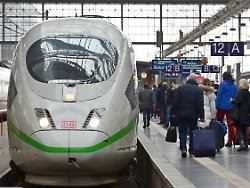Thursday March 25, 2021
Passenger numbers almost halved
Deutsche Bahn reports record loss
Missing passengers really hit Deutsche Bahn: The state-owned company posted a loss of 5.7 billion euros for the crisis year 2020. Despite lockdowns, there are hardly fewer trains running – that’s what the government has asked for. Nevertheless, the company remains optimistic.
Deutsche Bahn suffered a record loss during the Corona crisis last year. Also because of the slump in the number of passengers in regional and long-distance trains, the bottom line was a minus of 5.7 billion euros, said the state-owned company. The loss is thus even greater than recently expected. The operating loss (EBIT) was 2.9 billion euros.
Sales slumped by ten percent to 39.9 billion euros. At the same time, the company’s debts soared by five billion euros within a year and, according to corporate circles, have now exceeded the 30 billion euros mark. Railway boss Richard Lutz said the company will recover, the passengers will come back: “We are the vaccine against climate change.”
This year, the railway expects a slight improvement: “Nevertheless, considerable losses are to be expected again,” said the company. According to corporate circles, the operating loss, the loss before interest and taxes, will be 2.5 billion euros.
Long-distance passenger numbers halved
The main reason for the amount of the loss in 2020 is that the railway has largely maintained its services despite the drastic drop in passenger numbers in lockdown. This was also the wish of the federal government. According to corporate circles, only 81 million people drove long-distance transport with IC and ICE. In 2019 there were almost twice as many, at 150 million. In local transport, the decline was only slightly smaller. But even before the Corona crisis, the railway was in massive difficulties and could no longer finance its investments from its own resources.
The former near-monopoly has lost more than half of the market share in rail freight transport. The sale of the foreign subsidiary Arriva, in which the local transport in Europe is bundled, failed. The railway now had to write off 1.4 billion euros on Arriva, which further increased the net loss.
.
